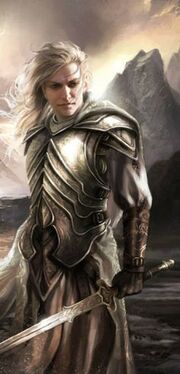
A portrait of the Elvish warrior Glorfindel in a role playing game based on JRR Tolkien's mythos.
Elf is a type of supernatural being in Germanic mythology and folklore. Reconstructing the early concept of an elf depends almost entirely on texts in Old English or relating to Norse mythology. Later evidence for elves appears in diverse sources such as medical texts, prayers, ballads, and folktales.
The definition of an elf in fantasy literature varies from author to author. In medieval Germanic-speaking cultures, elves seem generally to have been thought of as a group of beings with magical powers and supernatural beauty, ambivalent towards everyday people and capable of either helping or hindering them. In Old Norse mythological texts, elves seem at least at times to be counted among the pagan gods; in medieval German texts they seem more consistently monstrous and harmful.
In the England of Queen Elizabeth I, elves became conflated with the fairies of Romance culture, so that the two terms began to be used interchangeably. German folklore has tended to see the conflation of elves with dwarfs, leading to the "Christmas elves" image developed in the late 19th-century United States.
Elves entered the 20th-century high fantasy genre in the wake of works published by authors such as JRR Tolkien. Harry Turtledove's version of Elves, noted for their height, beauty, and longevity, largely depend on Tolkien's parameters, with the precise details variable as he sees fit.
Elf in "After the Last Elf is Dead"[]
Elves fought on the side of the High King in the last stand of good against evil. This did no good in the end, as they were overwhelmed and destroyed by the forces of the Dark Brother. The souls of the slain elves fled to the Isle of Forever, but even that place would not necessarily be safe forever from the Dark Brother's expansionism.
Elf in The Case of the Toxic Spell Dump[]
The elves of countries such as Aztecia and Alemania were miniscule pests who shot people with tiny arrows. The arrowheads of the Aztecian variety were made from obsidian, while the Alemanian elves preferred flint. Local shamans gained notoriety in these countries by developing medicines to treat elf-shot.[1]
Elf in "Coming Across"[]
Elves lived in the world which the Artist had made, and filled their millennia-long lives with hedonistic, extravagant pleasures. When not engaging casually in sexual activities, they soothed their sense of adventure by traveling to the world across the Door, and observing the culture of the humans there.
Elf in Every Inch a King[]
Elves were one of many sorts of wildunlife native to Schlepsig.[2]
See also[]
- Elves at the Tolkien wiki.
- Faerie, sometimes considered the same species.
References[]
- ↑ The Case of the Toxic Spell Dump, p. 131.
- ↑ Every Inch a King, pg. 81, TPB.
| ||||||||
| ||||||||||||||
| ||||||||||||||
| |||||